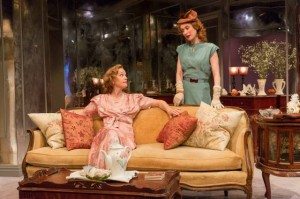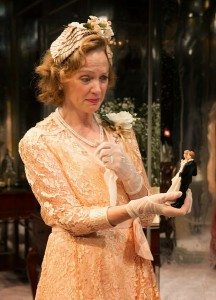

The Mint Theater is presenting a rare revival of George Kelly’s final play, The Fatal Weakness, which tells the story of an incurably romantic housewife who finds out that her husband is cheating on her. The production is directed by Jesse Marchese, who also serves as the Associate Director of the Mint Theater Company. Mr. Marchese was generous enough to take the time to discuss his discovery of the Mint, the themes of marriage and romanticism in The Fatal Weakness, and what other obscure plays he believes need revival.
StageBuddy: First, congratulations on a wonderful production.
Jesse Marchese: Thank you so much. I’m glad you enjoyed it.
SB: So my first question is how did you get your start in directing?
JM: Well I started acting quite young. I’m from Buffalo, NY and got involved in the local theatre scene in Buffalo, if you can believe there is one. (Laughs) It’s actually quite lively. I had my first equity job at Studio Arena Theater when I was in elementary school and that was our LORT regional theater in Buffalo, which is now sadly gone. I went to college at Marymount Manhattan for acting with a musical theater concentration. I took some directing courses then started doing some student productions and I fell in love with the work. So after college I did some assistant directing at the York Theater, then got a job about two and a half years ago at the Mint here as the Assistant to the Artistic Director.
SB: How did you come across The Fatal Weakness?
JM: A year ago, we did a play called Philip Goes Forth by George Kelly, and I directed a reading of The Fatal Weakness as a Further Reading, which is a program where we do a second reading of the playwright that we’re producing just to give the audience another taste of that author. It went over really well, and Jonathan Bank, my Artistic Director, and I realized “Well, this play is great! We should do this!”
SB: What is it about the Mint’s mission that speaks to you?
JM: I particularly am drawn to these well-made, patient, well-written plays, and then just that wonderful element of discovery. I first was aware of the Mint when I came to see a play called The Glass Cage in the fall of 2008. I felt like I was seeing a masterpiece, and I had that experience of “Why don’t I know this play like I know O’Neill or Arthur Miller?” We get a lot of the same plays revived on Broadway year after year, and there are so many plays that are just forgotten. That’s been happening for a hundred years now.

SB: Tell me a little more about what you responded to in this piece?
JM: Well, I fell in love with Kelly in general. His writing is so rhythmic and I love his acerbic sense of humor. He’s very unique in that he can have a moralistic edge, so he explores human failings in a way that is quite critical. But in The Fatal Weakness, I feel like he’s incredibly balanced in that while he presents the darker undersides of his characters, they’re still really charming. Kelly also allows his characters to be incredibly complex and complicated, which I think it a brave move. He allows them to be contradictory in a way that’s incredibly human, and psychologically astute. Another thing I love is how he plays with the truth, especially the ease with which the characters lies to each other and themselves.
SB: It explores many serious themes, but it’s also a very funny play.
JM: It is. But when it first opened in 1946, Brooks Atkinson had a problem with Kelly writing something between drama and comedy, and felt that he was wrestling with the dramatic strain and the comedy. Many people view this duality as a weakness, but I find to be a strength.
SB: What are some of the challenges of doing a period piece as opposed to contemporary drama?
JM: Well Kelly’s work is incredibly challenging. The language is very dense, and his writing is not quite the way we’re used to talking, so it’s difficult to find that rhythm and get everyone in the same world and that same sort of style. You have to be careful, because you can very easily flip into playing style. It’s not a style play—it’s actually very naturalistic. I told actors to not rush through the play—if you find every detail interesting, the audience will too.
SB: With its arguments on marriage, the play really feels like it could’ve been written today. What are some of the themes you find relevant in this piece?
JM: What’s really interesting about the year 1946 is that there was a huge peak in divorce rates right after the war. I watch the play and I even think of the gay marriage debate, just this talk of who deserves to be married, what marriage means. Also there’s this interesting theme Kelly’s exploring about sentimentalism and romanticism—marriage is work, but should sentimentality and romanticism be put aside so we can pragmatically reflect on our lives, or is it something that gives us a lifeline?
SB: What were some of your influences in directing this piece, if any?
JM: I was certainly inspired by the fast talking films of the 40s that featured strong women characters played by Bette Davis, Joan Crawford, and Rosalind Russell, but in terms of influences, it was all about Kelly. I’ve read almost all of his plays, and he explores a lot of similar themes, and there are similar character types in all his plays, so my biggest informer was Kelly himself, and having a sense of Kelly’s work helped me to navigate this play.
SB: What other obscure plays do you think need a revival?
JM: I would like to see more of Kelly’s plays. Craig’s Wife is a wonderful character study that won the Pulitzer. He wrote another fascinating play late in life called The Deep Mrs. Sykes about marriage and fidelity, but it’s got a much bigger cast, and is a much darker play. We also did John Van Druten’s London Wall earlier this year, which will be broadcast on October 2nd on PBS. I’m a champion for the playwrights we’ve produced at the Mint, but Kelly and Van Druten are my two favorite authors right now that I would love to see more of.

SB: You listed a bigger cast as a challenge of doing a period piece—what are some other challenges that are preventing more period plays from being revived at this scale?
JM: I think some of it has to do with resources and money. On Broadway, there are theatres that need to play it safe. You either go with a title that’s known, or you go with a star. Luckily, at the Mint we’ve built an audience base where they have fallen in love with the work, and they expect that the plays we produce will be worth seeing.
SB: What’s up next for you after The Fatal Weakness?
JM: We’re doing a reading on October 20th of an unproduced, unpublished Kelly play called When All Else Fails about a grieving widow’s second chance at love. It’s a charming and delightful comedy, so I’m excited for that. Otherwise, I’ve been the Assistant to the Artistic Director here at the Mint, I’m now the Associate Director, so there are new responsibilities I’ll be taking on here.
SB: Thank you so much for your time!
JM: Thank you!
The Fatal Weakness runs at the Mint Theater (311 W 43rd street, 3rd floor) through October 26th, 2014. The Mint’s production of “London Wall” will be broadcast by WNET on Channel 13 on Thursday, October 2nd at 9:00 PM EST. Tickets can be purchased at minttheater.org or by calling 866-811-4111.